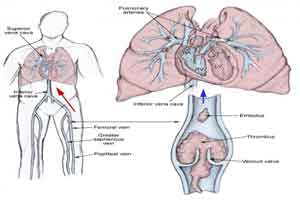- Home
- Editorial
- News
- Practice Guidelines
- Anesthesiology Guidelines
- Cancer Guidelines
- Cardiac Sciences Guidelines
- Critical Care Guidelines
- Dentistry Guidelines
- Dermatology Guidelines
- Diabetes and Endo Guidelines
- Diagnostics Guidelines
- ENT Guidelines
- Featured Practice Guidelines
- Gastroenterology Guidelines
- Geriatrics Guidelines
- Medicine Guidelines
- Nephrology Guidelines
- Neurosciences Guidelines
- Obs and Gynae Guidelines
- Ophthalmology Guidelines
- Orthopaedics Guidelines
- Paediatrics Guidelines
- Psychiatry Guidelines
- Pulmonology Guidelines
- Radiology Guidelines
- Surgery Guidelines
- Urology Guidelines
Pulmonary embolism only a rare cause of Syncope says new study

According to a new observational study conducted on more than 1.6 million adults who went to an emergency department for syncope in five databases in four countries (Canada, Denmark, Italy and the United States); data collected from 2010 to 2016, it has been found that contrary to popular belief, Pulmonary embolism rarely caused Syncope
Fainting (known as syncope) is a common symptom people can experience. A blood clot in the lungs (known as a pulmonary embolism or PE) has been recognized as a serious cause of syncope but data are scant and the evidence is conflicting on how frequent that is the case.
In more than 1.6 million adults who went to an emergency department for syncope in five databases in four countries (Canada, Denmark, Italy and the United States); data collected from 2010 to 2016, frequency of PE at emergency department and hospital discharge identified by diagnosis codes (primary outcome).
Giorgio Costantino, M.D., of the Fondazione Instituto di Ricovero e Cura a Carattere Scientifico, Ca' Granda, Ospedale Maggiore Policlinico, Milan, Italy, and coauthors conducted the present observational study. The researchers were not intervening for purposes of the study and they could not control all the natural differences that could explain the study findings.
It was found that the frequency of PE diagnosis ranged from 0.06 percent to 0.55 percent of all patients who went to the emergency department for syncope; among hospitalized patients, the frequency ranged from 0.15 percent to 2.10 percent. The main limitation is using administrative data to identify patients with syncope and PE because patients can be missed.

Disclaimer: This site is primarily intended for healthcare professionals. Any content/information on this website does not replace the advice of medical and/or health professionals and should not be construed as medical/diagnostic advice/endorsement or prescription. Use of this site is subject to our terms of use, privacy policy, advertisement policy. © 2020 Minerva Medical Treatment Pvt Ltd